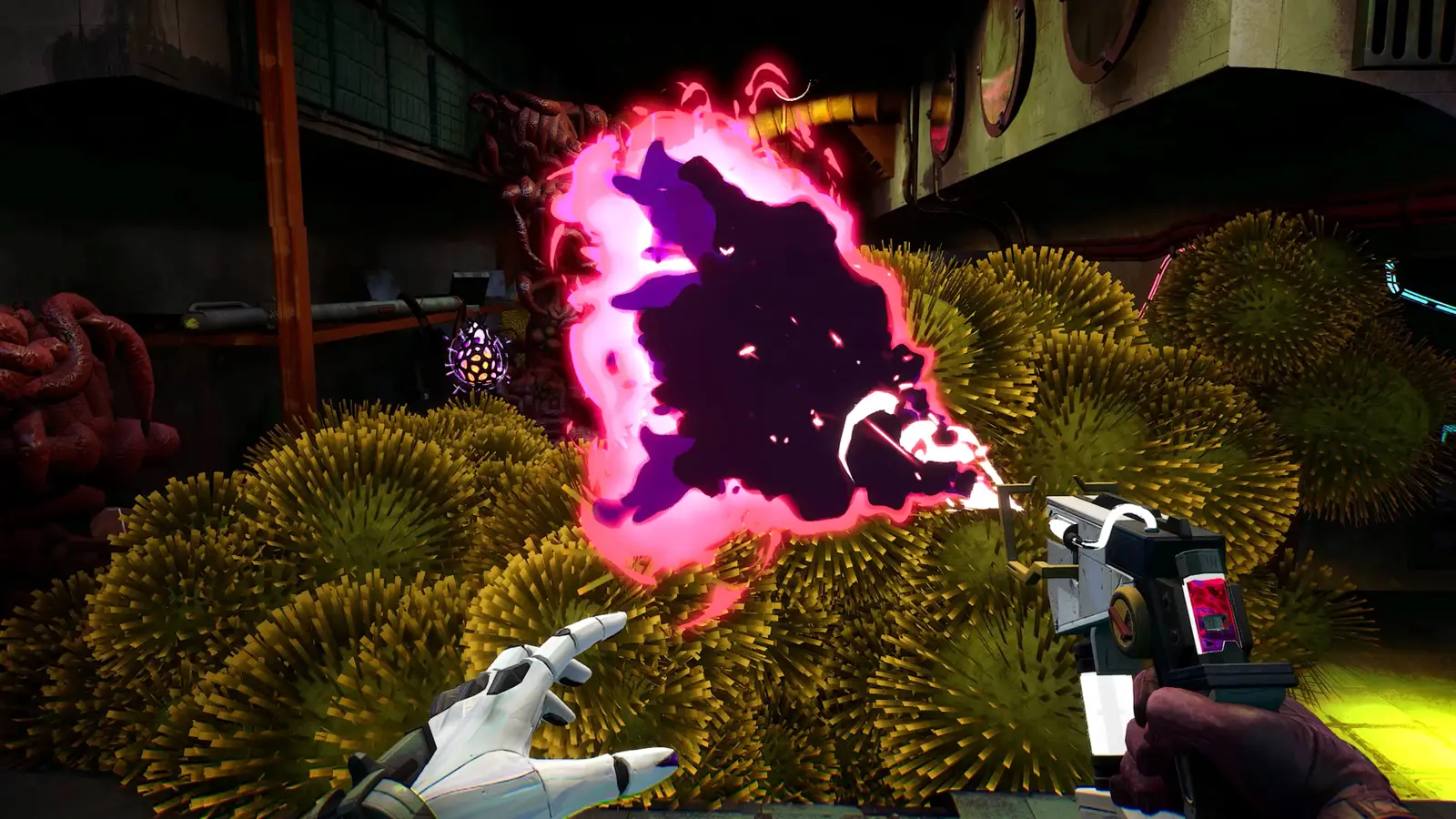
“Intimacy” is not the first word that comes to mind when talking about a first-person shooter, unless muzzle flashes to the face count as such. But the team at budding studio Soft Rains hopes to shake up the conventions of running and gunning with Ambrosia Sky.
As teased in a new story trailer for the 2026 release, the science-fiction game casts you as Dalia Kova, a deep-space disaster specialist who returns to her home in Saturn’s rings to confront a spreading alien contamination. Your mission is not to fight but to clean up fungi and lay the dead to rest. As a “scarab” — a kind of cosmic coroner — her mission requires her to harvest DNA for the mysterious Ambrosia Project. In the same breath, Dalia performs rituals that allow her to hear the words of the dead. As she navigates a decimated station, grief permeates her own memories, and players will realize her return to Saturn is more than professional.
“She’s laying people to rest, which is always heavy,” Soft Rains’ narrative director Kaitlin Tremblay told Polygon on a recent call. “But she’s also grappling with her own feelings and what it’s like coming back to a hometown when you have all this unresolved stuff as an adult.”
Ambrosia Sky could easily be mistaken for an FPS twist on The Thing or Alien, but as Tremblay and Soft Rains art director Adam Volker explained, the ambition for their upcoming game reaches beyond retro genre homage to dig into something messier, more alive, and deeply contemporary.
Extrapolating the weird
Tremblay and Volker said Ambrosia Sky’s trippy sci-fi setting and its core mechanics — a twist on the spray-cleaning you might find in PowerWash Simulator — were born out of developing its central character. A singular mantra gravitationally set every element of the game into place for Soft Rains: In this game, you are a scientist, not a solider.
“So then everything you do embodies this idea of being a scientist,” Tremblay said. “That includes nonviolent combat, that includes trying to feel clever and puzzle solving.”
The left-turn away from traditional gaming violence compelled Tremblay and Volker to summon their own inner scientist in order to explore the less trodden paths of cosmic fiction. Tremblay cited Jeff VanderMeer’s novel Annihilation (and the Alex Garland film adaptation) as a story that “did a lot for a certain generation of artists and storytellers, just in terms of the way it played with the boundaries of what makes you human, and how we interface with parts of the world that we don’t fully grasp or understand.” (How far does her love go? She has multiple Area X-inspired tattoos.)
For Tremblay, what VanderMeer did so well, and that she hopes the team achieved with Ambrosia Sky, was questioning everything. “I really like picking apart the places of sci-fi that are like, what are the spaces we don’t know? What are the areas that science can’t fully account for yet or that we don’t fully have a grasp on? And kind of digging into there.”
“What’s really exciting to me about the frontier of our space is that there’s still a bunch left to discover,” Volker says. As a designer on Ambrosia Sky, his number one mission was to “put more colors in our space” — and he didn’t have to look far for inspiration. “NASA’s been recently releasing photos of our solar system that have way more color in the planets than I expected, and I feel totally vindicated.”
Where the world meets the psychological
Volker calls Saturn’s rings as depicted in Ambrosia Sky a “boomed and busted” truck stop along the Route 66 of space. As a designer, it’s a thought experiment in what the timeline might hold for humanity as it inevitably pushes forward toward the stars, but also a foundation for something familiar that could support the emotions of Tremblay’s story. “Does this feel like an abandoned community on a rock in the middle of the galaxy?” he asks. “What type of places would Dalia recognize?” The levels couldn’t let the story and mechanics sit like oil and water.
The design of Ambrosia Sky also swerves away from conventional genre markers. Tremblay found inspiration in medieval medicine, in how people once struggled to explain the inexplicable. “Part of making something interesting and new and contemporary comes from maybe looking backwards.” Which is how she landed on the idea of the scarabs, a monastic order who are “trying to essentially find immortality, but much more specific. They want to understand how people in the world in outer space die so they can start trying to dissect and understand how to reverse cellular decay. And so that’s what is called the Ambrosia Project.” Clinging to the concept, Volker went wild designing a visual language for this universe’s “space witches.”
Dalia is a scarab, but “not really a believer,” says Tremblay. “She was this kid who came from this back country truck stop, asteroid colony who really wanted to get away from her oppressive stepmother and had this opportunity to join up at the scarabs.” Also, she can stomach death — signing up for death cleaning was a natural fit.
Many games of this ilk would offload story into discoverable lore books. Tremblay wanted something more organic. “If a player never reads a single terminal, somehow manages not to listen at all to the dialogue, do they still get a sense of who she is?” she asks. For her, the answer is in the mechanics. What Dalia can’t do — what the game forbids her from doing — defines her as much as what she says.
Still, Dalia’s voice captures that tension. Players hear her dictating observations in the clipped tone of a coroner’s report, but “professionalism’s going to crack,” Tremblay teased. “I tried to write this interesting voice that would help ground her as a person.” The absence of combat doesn’t make the story lighter. If anything, it makes the themes heavier. “The idea of being alone, approaching your own inner demons, and doing it by yourself while you record your thoughts for your best friend — it’s a pretty relatable journey, to be honest.”
At a glance, Ambrosia Sky may look like a sci-fi action game about clearing out alien fungus. Not wrong. But according to the team, it’s even more about endings — of relationships, of communities, or our times on this mortal coil. Where most games hand you a weapon, Soft Rains gives you a ritual. Bravery will still be required.



